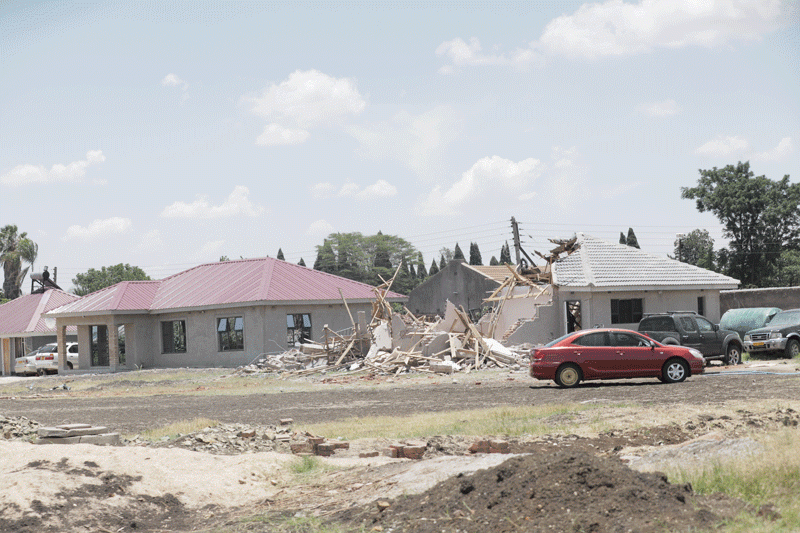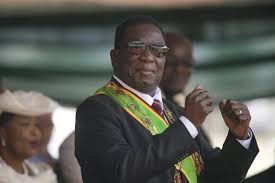
THE Zanu PF government this week lived up to its reputation of being a double-headed Janus when it went all out to distance itself from demolition of illegal houses in Ridgeview, Belvedere, by the Harare City Council.
Double-headed Janus, a mystic being with two heads and one body can be saying something while the other is saying something completely different.
It behaves in the same manner of good cop and bad cop that is familiar in police investigations or parenting, where one parent is seen as bad for instilling discipline while the other acts as good to the child.
Zimbabwe has had the experience of the State destroying people’s homes. The most heinous destruction was Operation Murambatsvina, where more than 700 000 families were left homeless in urban areas for living in illegal structures.
The operation, done in the spirit of cleaning up urban areas, however, served also a political purpose of disenfranchising supposed opposition political supporters.
Events last week in the capital were quickly dubbed Operation Murambatsvina 2 by the media. This was a strong comparison and the government sensing the backlash from the public quickly distanced itself from the demolitions.
Local Government minister Daniel Garwe told the media: “We condemn that action, and yesterday, we directed the mayor and town clerk to stop the demolitions. We distance ourselves from, and the central government distances itself from, such behaviour. We have nothing to do with that.”
Garwe was not done. He extolled the virtues of the central government too, creating a sense of a paternalistic regime.
- Harare cancels Pomona waste deal
- Devolution gains remain a mirage
- Benzema confident Real will reach UCL final
- Harare cancels Pomona waste deal
Keep Reading
“The new dispensation values all citizens and respects the Constitution, which says housing is a fundamental right. People have the right to housing, but that said, we must not take the law into our own hands and say, I can build a house wherever I want,” before feebly adding, “The law will still visit you. We do not want to take advantage of certain developments, and people must not start building recklessly.”
The city had been castrated. It was now impotent, just like developments post 2000 when Zanu PF activists were allowed to develop shanty suburbs in Caledonia, Mabvuku, and Hopley adjacent to Waterfalls, with the opposition-led council looking on powerlessly.
Journalist Hopewell Chin’ono brought to light why Zanu PF was piqued by the demolitions. He gave names to the land barons who fleeced the unsuspecting public who purchased the 52 stands in Ridgeview.
Chin’ono posted on X: “Meet Spencer Mabeka, the land baron who sold land illegally, leading to properties built on that land being demolished!
“You all saw the properties illegally built in Harare being torn down, and you also saw how Zanu PF stepped in yesterday to stop the demolitions. Many have questioned why the law was applied selectively, it is because the land baron who sold the land illegally is Zanu PF! Land barons are Zanu PF! This man and his accomplice sold 45 plots of land for between US$25 000 and US$40 000 each, raking in millions of dollars.”
Mabeka, interestingly, was once a Zanu PF candidate for Harare ward 16 in the November 7, 2015 by-election.
This is not an isolated case. It is an open secret that Zanu PF apparatchiks are the biggest land barons and profited from public and natural resources — land — on the peripheries of urban centres.
It is common cause that there has been an inquiry into urban land by Justice Uchena and the report is still to be made public.
From an informed layman’s perspective, it is conceivable that shelving the report is deliberate and meant to protect implicated party honchos.
It cannot be over-emphasised that Vision 2030 by President Emmerson Mnangagwa depends on clear planning of developments. Planned developments need coherent policies and regulation.
The regulation can be in two complementary phases — central government and local authorities.
It is, therefore, important that local authorities be empowered statutorily to have powers to control and regulate developments within their jurisdictions.
This cannot be achieved when the central government has double standards on illegal settlements depending on the personalities who are doing the developments.
In short, selective application of laws cannot and will not be a driver of development.
It is clear that many Zanu PF-led developments fall foul of urban planning regulation.
There have been many developments that, for instance, have been done on wetlands against both domestic and international environmental conventions.
In light of the above, it is imperative that devolution as envisaged in the 2013 Constitution should be immediately implemented.
This calls for the review of the Urban Councils Act to give local authorities more planning and regulatory powers.
However, this should be linked or related to each local authority’s approved master plan. This point cannot be over emphasised.
It is abundantly clear that Murambatsvina was a political weapon against the opposition and had nothing to do with illegal developments per se.
Zanu PF was afraid of losing power and still has lingering fear of it that it has no spine to decisively act on illegal developments if there is political capital to be gained from it.
Harare, for now, is the victim of Zanu PF’s duplicity, but it needs to demonstrate that it is a local authority that has the interests of organised and planned development by taking the central government head-on on these matters.
Taking action against the central government is not new in the region or internationally. Two quick examples will suffice.
The City of Cape Town in South Africa and London in England can show how independence and complementarity between central and local governments work.
Post 2000, Cape Town and London had been under the control of opposition political parties, while the central governments were led by the African National Congress and the Conservatives, respectively.
It is neither here nor there that the local authorities at some points had to assert their autonomy, particularly on local issues.
However, for this to happen, Zanu PF should stop the duplicity and have one of Janus’ heads cut off.
It has to stop being ambivalent on issues or seek to score cheap political points on development issues.
- Paidamoyo Muzulu is a journalist based in Harare. He writes here in his personal capacity.










